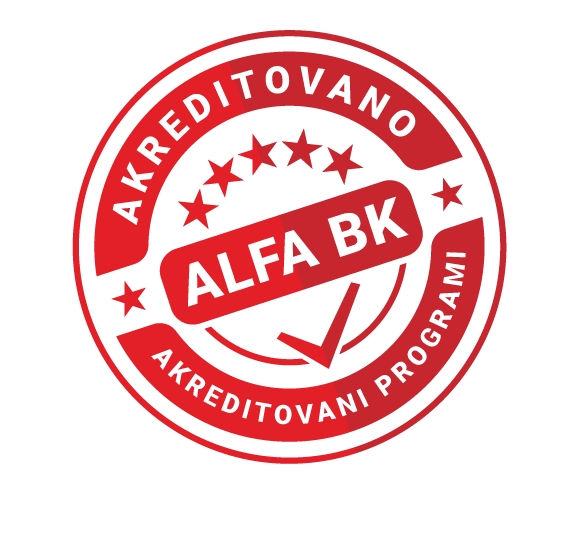INFORMATION AND COMMUNICATION TECHNOLOGIES
SCIENTIFIC, PROFESSIONAL OR ART SPHERE:
Electrical Technologies and Computer Engineering.
Form of Education:
Basic Academic Higher Education
SCOPE OF TRAINING EXPRESSED IN ESPB POINTS:
240
NAME OF THE SPECIALTY:
Bachelor of engineering in electrical technologies and computing equipment
TRAINING PROGRAM DURATION:
4 years (8 semesters)
Accredited training program in Information and Communication Technologies is provided at the Faculty of Information Technologies. The structure and content of the program comply with the standards of the Commission for Accreditation and Quality Inspection of the National Higher Education Board, as well as with the international standard and the Law on Higher Education.
The Information and Communication Technologies basic higher academic training program lasts for four years (8 semesters) and belongs to the area of technical and technology science; its scientific scope includes electrical technology and computer engineering. After completion of education, the graduates are awarded the degree of basic academic training – bachelor of engineering in electrical technologies and computing equipment. The conditions for awarding the degree of a bachelor of engineering in electrical technologies and computing equipment are as follows: the student must pass exams in all disciplines provided for by the program, earns a total of 240 ESPB points and defends the diploma paper.
The goal of this training program is to provide general bachelor’s degree education in the field of electrical technology and computing equipment ensuring the possibility of practical work on computers in economics during all stages and in all roles in course of development of software in all spheres of human activity.
The tasks of the training program are as follows:
- introduction to main information principles, methods and techniques;
- acquisition of knowledge, methods and techniques of various programming languages through structural, object-oriented, functional and logic programming;
- gaining advanced knowledge of algorithms, operating systems, databases and information systems, computer networks and artificial intelligence;
- training in the use of software complexes for 3D modeling and animation, image processing, editing and visual effects, web design, video and multimedia;
- introduction to electro-technical and communication disciplines;
- preparation for successful practical application of computer techniques.
The Information and Communication Technologies training program is integral and extensive and corresponds to several foreign programs. Conditions of enrollment and progressing to the next year’s course, as well as receiving diploma and training method have been agreed upon with certified European programs. Academic staff with necessary scientific and professional competences is provided for implementation of the Information and Communication Technologies training program:
BOOK OF STUDY SUBJECTS
TUTOR'S BOOK
STUDY SUBJECTS
English Language 1 – 5 ESPB points
Mathematics 1 – 7 ESPB points
Information and Communication Technology Basics – 7 ESPB points
Sociology – 5 ESPB points
Mathematics 2 – 6 ESPB points
Information System Basics – 7 ESPB points
Programming 1 – 6 ESPB points
Computing Mathematics – 6 ESPB points
Programming 2 – 6 ESPB points
Electronics for Computer Scientists – 5 ESPB points
Total: 60
Data Algorithms and Structures – 7 ESPB points
English Language 2 – 5 ESPB points
Signals and Systems – 6 ESPB points
Computer System Architecture – 6 ESPB points
Discrete Mathematics – 6 ESPB points
Telecommunication Basics – 5 ESPB points
Operational Studies – 4 ESPB points
Object-Oriented Programming – 5 ESPB points
Optional Subject 1 – 8 ESPB points
Optional Subject 2 – 8 ESPB points
Total: 60
Optional subject 1
Computer Graphics – 8 ESPB points
ERP Enterprise Resource Management Systems – 8 ESPB points
Optional subject 2
Modeling and Simulation – 8 ESPB points
Human-Machine Interface – 8 ESPB points
English Language 3 – 5 ESPB points
Operating Systems – 6 ESPB points
Probability and Statistics – 5 ESPB points
Computer Networks – 6 ESPB points
Data Bases – 6 ESPB points
Web Programming – 6 ESPB points
Multimedia Communication Systems – 5 ESPB points
Software Development – 5 ESPB points
Optional Subject 1 – 8 ESPB points
Optional Subject 2 – 8 ESPB points
Total: 60
Optional subject 1
Internet Marketing – 8 ESPB points
Quality Management – 8 ESPB points
Optional subject 2
Software-Based Program Management – 8 ESPB points
Decision Support Systems – 8 ESPB points
Artificial Intelligence – 6 ESPB points
English Language 4 – 5 ESPB points
Computer System Security – 7 ESPB points
Professional Practice – 2 ESPB points
Information Theory and Coding – 6 ESPB points
Information System Design – 8 ESPB points
Optional Subject 1 – 9 ESPB points
Optional Subject 2 – 5 ESPB points
Total: 60
Optional subject 1
Digital Signal Processing – 9 ESPB points
Information System Management – 9 ESPB points
Optional subject 2
Information System Marketing – 5 ESPB points
Statistical Telecommunication Theory – 5 ESPB points





